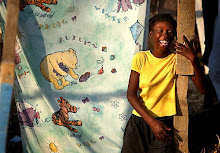Earthquakes can be devastating, debilitating & demotivating. They can test the best in us – our strength, our patience, our compassion & our love. They are horrific, heart-wrenching natural spectacles – thrusted upon us by no fault of our own. They destroy our buildings, our schools, our hospitals, our homes, but above all, they break the human spirit –the constant fighter, the Ninja warrior, the core of all human growth, progress & development.
On Jan 12, 2010 Haiti Léogâne , approximately 25 km (16 miles) west of Port-au-Prince , Haiti
Many countries responded to appeals for humanitarian aid, pledging funds and dispatching rescue and medical teams, engineers and support personnel. Communication systems, air, land, and sea transport facilities, hospitals, and electrical networks had been damaged by the earthquake, which hampered rescue and aid efforts; confusion over who was in charge, air traffic congestion, and problems with prioritization of flights further complicated early relief work. Port-au-Prince's morgues were quickly overwhelmed; tens of thousands of bodies were buried in mass graves. As rescues tailed off, supplies, medical care and sanitation became priorities. Delays in aid distribution led to angry appeals from aid workers and survivors.
Aid is still needed. A single cent, a single rupee counts – it can bring the life back on track for the survivors. We understand that it’s not enough – but it still is important, it does make a huge difference, it does bring a smile back on a few faces, if not all.
Miseries no doubt are devastating, debilitating & demotivating, yet they are universal, unifying & uniting.…………




0 comments:
Post a Comment